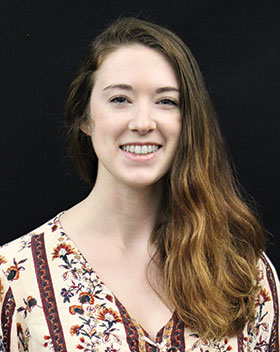Involvement Leads to Networking
Winter
2021
Letter
Involvement Leads to Networking
by Kourtney Adkisson, Associate Zone Councilor Representative, SPS Executive Committee, Central Washington University
 Personal support networks adapt with the seasons of life. In high school I was passionate about music and running, leading to my participation in band, cross country, and track and field. These activities led to my first real networking opportunities. I discovered incidentally that my cross country coach not only shared my passion for running but also taught our AP physics course. My parents were always telling me that I should take a physics class since I loved mathematics (a trait that seems to be rare, though maybe not as rare to physicists). I figured that with a great teacher and support from my family, I might as well try.
Personal support networks adapt with the seasons of life. In high school I was passionate about music and running, leading to my participation in band, cross country, and track and field. These activities led to my first real networking opportunities. I discovered incidentally that my cross country coach not only shared my passion for running but also taught our AP physics course. My parents were always telling me that I should take a physics class since I loved mathematics (a trait that seems to be rare, though maybe not as rare to physicists). I figured that with a great teacher and support from my family, I might as well try.
That same year, our physics class was visited by a physics recruitment officer from our local college, and we were made aware that the SPS chapter there needed volunteers for its annual “Savvy Science Spectacle,” affectionately known as S3. I jumped at the opportunity, unaware of the community that I would gain from such a lighthearted decision. During the event, I got to shoot off a ping-pong ball cannon (after proper safety training) that crushed aluminum cans like they were made of paper. There were more intriguing demonstrations, including a Van de Graaff machine, and another showing angular momentum while spinning. Participating in these demonstrations also taught me how to describe physics phenomena to others of a young age.
By taking the opportunity given to me in high school, I wound up in the physics department at Central Washington University (CWU). After my first year, I got involved in CWU SPS. I started small, serving as the representative to our school senate, a twice-a-month obligation that opened my eyes to all the opportunities—and funding—available to our club. During those first years, I was involved in many more demonstration nights for the community, and I heard about other club members’ experiences at national conferences and on local trips. My third year in SPS, I was elected local president, which enabled me to organize field trips to places like LIGO Hanford and the Museum of Flight in Seattle. My momentum and excitement built, but there was still something missing. With membership in our local club came membership in SPS National, but I didn’t really know what that meant. I soon found out more.
I was coming off of a busy year, having just completed our electromagnetic theory courses, the differential equation series, and quantum mechanics, all while working three jobs. Let’s face it, being a physics major is hard. However, that same physics recruitment officer from high school, Deanna Marshall, encouraged me to run for the position of the complementing associate zone councilor (AZC) to her zone councilor (ZC) in the upcoming SPS National Council election. The AZC supports all the chapter officers within a zone and connects them with resources from the National Office, and the ZC supports the chapter advisors. How could I say no?
Since then, each year I’ve read chapter reports, met new people, improved my elevator speech, helped rejuvenate inactive chapters, presented at national conferences such as the 2019 Physics Congress, and more than anything, built and maintained a network of individuals who have supported me in my pursuits. Even after completing my undergraduate work, I have the opportunity to influence other undergrads in the same way that others helped me. Not to mention, my network helps me stay involved in the physics community.
I encourage anyone who is looking for both friendships and professional connections to search for ways to become involved, even in a small fashion. This issue of the SPS Observer highlights some of the great work done by the SPS community over the last year. I invite you to check out the efforts described here and find some tips or inspiration to propel your chapter’s endeavors.
The network you build throughout your academic and professional life will become the base from which you move forward. Meeting your local chapter president or your AZC are two great ways to get started.
